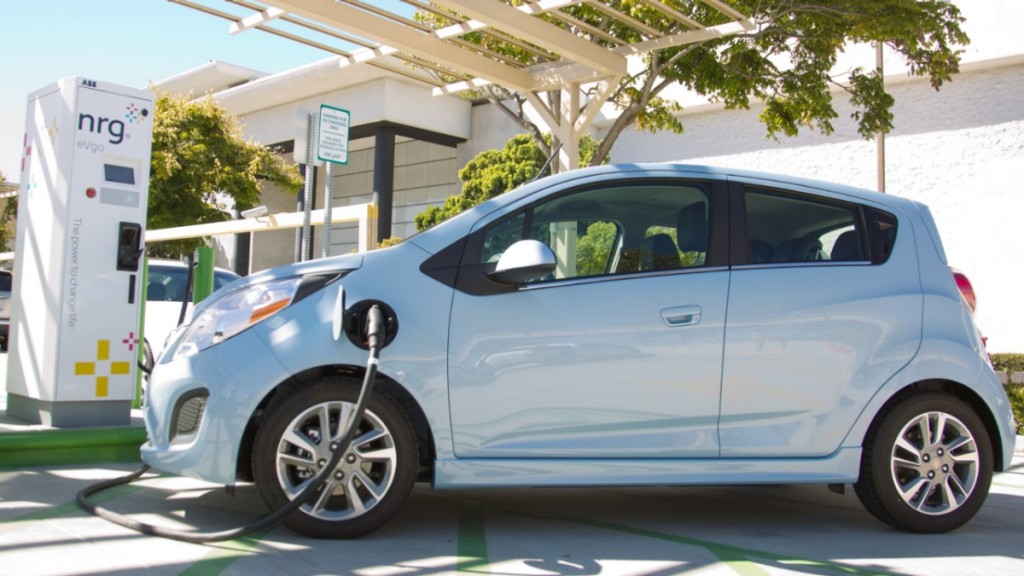DC fast charging helps alleviate one of the major roadblocks to electric-car adoption--limited range--by giving drivers more ability to travel longer distances.
That's why carmakers and other entities back the installation of more and more DC fast-charging sites.
DON'T MISS: BMW, VW, And ChargePoint To Build 100 CCS Fast-Charging Sites For Electric Cars
The benefits of a quicker charge are obvious for electric-car owners, but what about station operators?
With some fast-charging stations providing power free to entice drivers, it can be hard to make operating one financially sustainable.

Chevrolet Spark EV at CCS fast charging station in San Diego.
A for-pay market in fast charging hasn't yet emerged, according to a recent Navigant Research blog post.
Meanwhile, the businesses that operate charging stations on their property have to deal with significant costs.
The post cites a report from North Carolina-based firm Advanced Energy, which launched a program to install up to 10 DC fast-charging stations in North Carolina in March 2013.
ALSO SEE: Electric-Car Fast-Charging Networks: Competition Heats Up
Host sites were responsible for both installation and operating costs, and electric-car drivers could charge for free.
The charging stations themselves were also provided free, but applicants still had to pay $20,000 to $60,000 to install them.
That was cited as one of the reasons why--out of a pool of 16 applicants--only five sites ended up installing the fast-charging sites.

Fast Charging 2011 Nissan Leaf
One factor that boosts costs for DC fast charging--as well as 240-Volt AC Level 2 charging--is digging a trench or otherwise connecting stations to a power source.
In addition, DC fast charging comes with far higher power requirements--sometimes enough to trigger demand fees from utility companies.
Yet while money may be an issue, encouraging electric-car drivers to use the new charging sites is not.
MORE: Is There Any Business Model For Public Electric-Car Charging? Plug-In 2013 Report (October 2013)
The availability of free DC fast charging at the two North Carolina sites boosted charging sessions to around 500 combined in the third quarter of 2014--up from around 350 sessions during the previous two quarters.
Navigant argues that this level of usage--from only about 3,100 plug-in electric cars on North Carolina roads--doesn't sound like it would be profitable even if drivers did pay to plug in.

DC fast charging 2015 Kia Soul EV
So what happens when drivers do have to pay to charge?
A fast-charging station installed at a Marriott Hotel in San Juan Capistrano, California--about halfway between Los Angeles and San Diego--reportedly generated $10,000 in revenue for service company Evoasis, based on a fee of $10 to $15 per hour that was instituted a few months after it opened.
However, that's based on a total of 2,900 charging sessions over 18 months, in the state that has more plug-in cars on its roads than any other.
North Carolina and other states with smaller fleets of electric cars aren't yet attracting as much demand, but they'll still likely need DC fast-charging stations to get boost the number of plug-in cars on their roads.
That may appear to be a no-brainer for supporters of electric cars, but it's less clear what will happen to those hoping to make a profit off fast charging.
_______________________________________________












